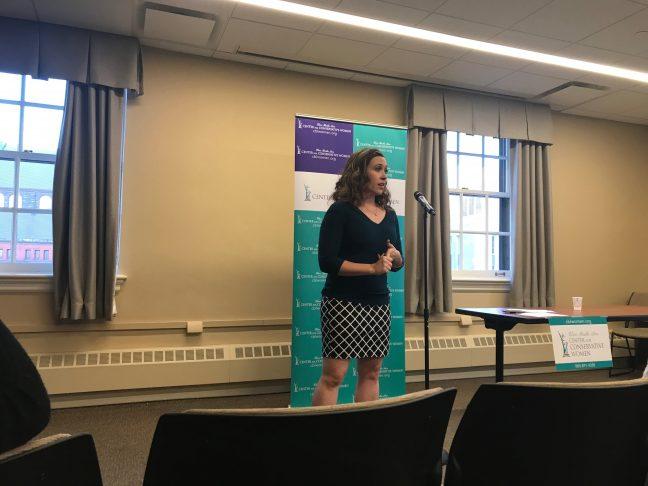The University of Wisconsin-Madison chapter of the Clare Boothe Luce Center for Conservative Women hosted a talk on “Living after Surviving” by Amanda Collins Johnson Tuesday evening.
While attending the University of Nevada-Reno, Johnson — founder of Teaching and Empowering Assault Rape Survivors Speak — was raped at gunpoint by a stranger. Johnson spoke about her own healing process — how she went from just surviving the traumatic event to actually living again.
“I didn’t know him,” Johnson said. “But suddenly his face was so ingrained in my memory and I knew that I would never be able to pray it away … In that moment … my spiritual pulse flatlined. I survived, but it didn’t make me stronger … What good was surviving if I was no longer living.”
Johnson said her recovery can be attributed to her metaphorical backbone, wishbone, funny bone and rib cage.
Johnson’s “backbone” — which she defined as something that gets you out of bed in the morning, something larger than yourself — is her faith. Her “funnybone” — important because “a cheerful heart is a good medicine, but a crushed spirit dries up the bones” — is her ability to take advantage of opportunities to laugh. Her “ribcage” — and what kept her alive, she said — is her support system.
While Johnson said she used her faith, the ability to take time to live and her support system to aid in her recovery, she was also concerned with the possibility of others having the same experience. This, she believes, could be prevented by allowing campus concealed carry.
At the time of her assault, Johnson had a concealed carry permit, but because she was on a college campus, she was not allowed to use it, she said. Her experience led her to advocate for holders of concealed carry permits to carry their guns on college campuses. Johnson’s advocacy work became her “wishbone.”
“I had been legislated into being a victim because the very law that was meant to ensure my safety ensured my attacker that I was going to be an unmatched victim for him,” Johnson said.
Since she was young, Johnson said she did everything she could to avoid being victimized. But while she was telling her story to legislators as a part of her advocacy work, she was asked what she was wearing and what she could have done differently, and told to get over it because it was just a few minutes of her life.
The treatment she received led Johnson to the conclusion that people just don’t care about “women’s dignity.”
“Women continue to get raped every minute of every day in this country,” Johnson said. “And people don’t care. I say that because if they did, I would not have gotten the questions that I got. It would have been ‘Enough is enough, we are going to do what we can in order to ensure that our young women and men can go to school and preserve their dignity and keep their lives intact and not have to try to learn how to live after surviving unspeakable trauma.’”
This realization led Johnson to found TEARS Speak in order to help survivors learn how to live again. Johnson hopes to eventually have a fully-funded facility where survivors can come for resources to help them in this process.
Johnson said until then, she will continue educating survivors and those around them.
“If you’ve endured [rape] or anything traumatic, I want you guys to know that you have what it takes, you have the resiliency in you … to be able to live a full life again,” Johnson said. “This is not the end of your story. My [Brazillian host father, from when she studied abroad] used to always tell me when I was homesick, ‘Amanda in the end, everything will be okay, and if it’s not okay, it’s not the end.’”


